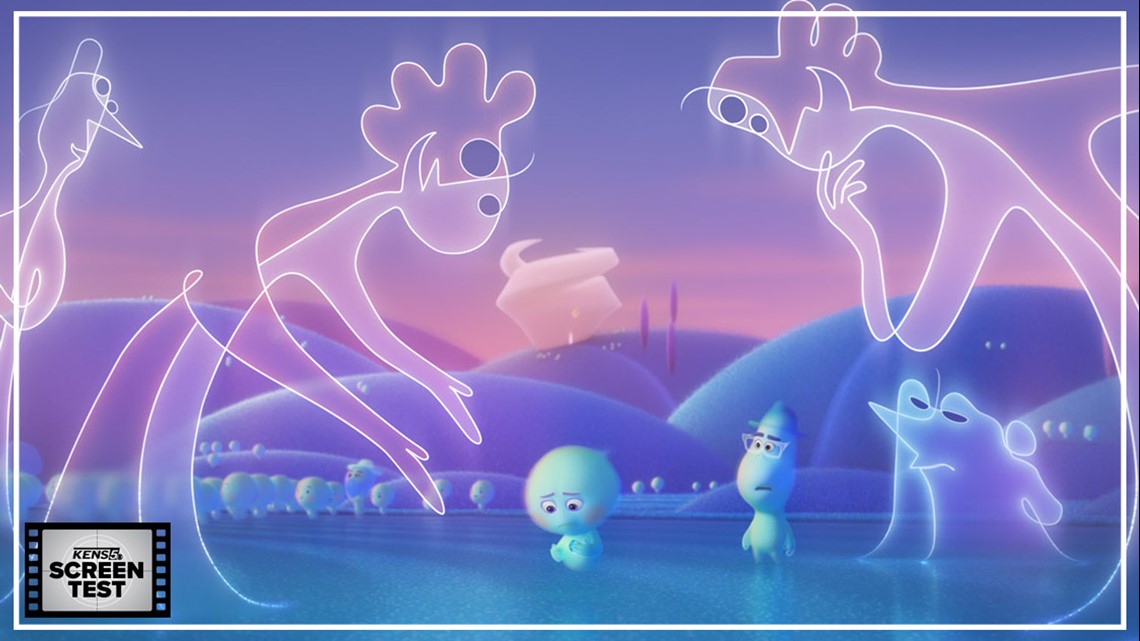Pixar last month turned 25 and, perhaps like those who can glimpse images from “Toy Story” and “A Bug’s Life” among their earliest movie-watching memories, the studio finds itself going through a quarter-life crisis. If we can imagine an entertainment company as humanistic (stick with me; I promise this isn’t more high-concept than the premise behind their newest movie), we can also imagine the questions Pixar may be asking of itself: “Why am I here? What is my purpose? Who am I trying to satisfy first and foremost?”
It only makes sense for Pixar to weave those questions explicitly through its storytelling. And so the studio does with its latest feature, “Soul,” co-directed by Pete Docter, a veteran Pixar guru and its current chief creative officer (Kemp Powers is his directing partner, and the first Black director in the company’s history). It’s become enticing in recent years to consider the studio’s place on the filmmaking landscape, not only because more and more companies are inspired to meet the standards of a genre that Pixar revolutionized in the ‘90s, but also because no one can definitively say whether the existence of such a thing as “the Pixar standard” is more a curse than simply a marker of success. Is the company still soaring, or falling with style? And who is the best audience to determine an answer: The twenty-somethings who have grown up alongside Woody and Buzz, or the tykes for whom animation is ostensibly primarily expected to serve?
“Soul,” if you allow it metatextual leeway, shows Pixar wrestling with these questions. But taken on its own terms, it’s also a serviceable, pretty funny, slightly ostentatious movie concerned with some of the most spiritual concepts a movie can possibly concern itself with. There’s a joke at the expense of the New York Knicks that made me laugh as hard as I’ve laughed all year. There’s some gorgeous, standard-resetting animation. And there are existential ideas about self-worth and purpose that left me scratching my head in their execution right before breaking a sweat in lifting my...well, you know. Some said Pixar’s last feature, “Onward,” came to feel like rote output that could have been made by Dreamworks. I don’t see anyone saying the same about “Soul.”
We follow Joe Gardner (Jamie Foxx), a jazz pianist in the Big Apple for whom passion comes easy, but validation remains elusive. He teaches middle school band part-time to students who would mostly rather be anywhere else, and the thing is: So would Joe. That’s why when the offer of a full-time gig with pension and benefits – the works! – comes along, he’s more reluctant than relieved. We sense that teaching was just a way for him to get by while waiting for that stroke of luck that turns him into a star, with an audience that appreciates him more than the kid using his trumpet to vacuum Skittles off the floor. He’s clearly of that lineage of Pixar protagonists who toil through daily routines daydreaming of something more.
RELATED: 'Onward' Review: Pixar's family fantasy is satisfying, standard fare from the animation giant
Sticking with that narrative tradition, an opportunity arrives for Joe in the form of a once-in-a-lifetime chance to play with famed musician Dorothea Williams (Angela Bassett, satisfyingly saucy-ing up a small role). In his jubilation, Joe misses an open pothole and falls to his demise...or so the implication goes as his humanoid form is replaced by a blueish-green blob – a manifestation of his soul, as it were – that lands in a bizarre wonderland of rolling hills and imaginatively realized constructs where young souls literally dive to Earth while dying ones are ferried to “the Great Beyond” on a cosmic escalator.
Yeah, “Soul” is heady. And the movie’s most amusingly morbid flourish might be how souls finally “die” the same way bugs are zapped out of existence. Over in the Great Before, the requisite machinations are explained a literal seminar—infant souls are mentored until they find their “spark,” effectively stamping their ticket to Earth and existence as we know it. Meanwhile, Joe sneaks off the path to ultimate demise, hell-bent on bending the rules to get back to his body. This being Pixar, some self-discovery awaits, as well as the mischief of the Tina Fey-voiced 22, a renegade soul with a reputation for never having found her spark. (Ironically enough, 22 Pixar movies precede “Soul.” Make of that what you will.)
RELATED: Every Pixar movie, ranked
This all makes the story a bit overstuffed, and the kiddos may find themselves on a tightrope endeavoring to stay engaged. But the studio isn’t new to this game—they practically invented it. The theoretical constructions of “Soul” are clear riffs on “Coco” and “Inside Out,” and it gets out in front of audiences by weaponizing the obviousness of it all—though it can be difficult to tell where obviousness ends and sincerity begins. Abstract ideas are animated as friendly hosts that look like homicide scene chalk outlines; “lost souls” are tentacled ink blobs meandering across a barren, lonely zone; and techno-snazzy melodies from composers Trent Reznor and Atticus Ross lend a touch that is both profoundly playful and playfully profound. Talking toys and fish is one thing, but “Soul” isn’t allegory; subtext is text, and the balance of cuteness and adult-pitched ironies threatens to wear itself out before the story jump-starts by returning to the lively streets of New York City via a funny “Freaky Friday” situation that creates avenues for giddy hijinks, coherent objectives and soul-searching (sorry). If the movie’s first act in the Great Before establishes motivations, the earthbound portions of “Soul” challenges them—and it becomes more interesting and organic as a result.


It also puts the studio’s technical efforts on full, stunning display. Once upon a time, we marveled at how Pixar gave toys life, and were later awestruck at its vision of life in underwater societies. In “Soul,” the studio’s tireless animators don’t just digitize humans; they create the nuances of familiar emotional shifts and physical gestures, translating the rockiness of a mother-son relationship and etching nirvana onto Joe’s face when he’s in the zone at the ivory keys. Even as it’s approximating reality, Pixar’s magic glistens; “cartoon” is too cheap a word for it, even if the term is synonymous with the movie’s screwballier moments. The beauty of Pixar’s New York City makes for lovely contrast, too, with the blissful visual chaos of its theoretical realm, where efforts to approximate reality are traded for zanier endeavors. The movie’s narrative allows its visual maestros to do more than go through expected evolution—it allows them the freedom for expansion as well.
And yet, for how much that aesthetic splendor runs the gamut of invention to emphasize specificity – and perhaps partly because of it – the film’s revelations about life emerge as raw generalization. “Soul” lives and dies on the literalization of its themes. By the film’s finale – capped with a rather tired chase sequence and requisite dose of stormy pathos – that literalization has ironically blunted Joe’s emotional depth. As a result, he emerges less as his own character and more as vehicle for the screenplay’s ideas. Seeing as how he is the first Black Pixar protagonist and considering how long it took for the studio to shift its storytelling gaze to the Black community in a meaningful way…that’s frustrating. Devoid of epiphanies as sharp as those from stronger Pixar fare, “Soul” operates as a lowest common denominator of the company’s greatest recent hits, cheapening its most unique elements.
“We’re in the business of inspiring others,” one of the Great Before’s denizens says in a quiet moment in “Soul,” and the words almost take you out of the story for how explicitly they reflect what could be Pixar’s modus operandi. Is the studio reminding us of its creed, or itself? Its lukewarm success makes answers harder to come by. Pixar movies have always provided an entry point for imagining the studio’s place through a metatextual lens. With “Soul,” Pixar is fervent about emphasizing its own legacy, to the point of distraction.
“Soul” is rated PG for thematic elements and some language. It’s available to stream on Disney+ on Christmas.
Starring: Jamie Foxx, Tina Fey, Graham Norton, Rachel House
Directed by Peter Docter and Kemp Powers
2020
MORE SCREEN TEST REVIEWS:
- ‘Farewell Amor’ Review: Ekwa Msangi’s tale of African immigration is modest and contemplative
- ‘Let Them All Talk’ Review: Steven Soderbergh takes a vacation, returns with a delightful romp about art and life
- ‘Mank’ Review: David Fincher’s return to movies is a wry, deliriously lively examination of a paradoxical Hollywood
- ‘Anything for Jackson’ Review: A grieving couple is in over their heads in this creeptastic, subversive horror flick
- ‘Nomadland’ Review: Frances McDormand ventures west in a lament and tender celebration of America’s final frontiers
- 11 streaming recommendations for December
- ‘Hillbilly Elegy’ Review: A purposeless diagnosis in a moment that demands more
- ‘Sound of Metal’ Review: An innovative feat of auditory filmmaking, and a career-best Riz Ahmed
- ‘The Twentieth Century’ Review: The most absurdly demented movie of 2020



